 W
WIrredentism is a political and popular movement that claims, reclaims, and seeks to occupy territory that the movement's members consider to be a "lost" territory, based on history or even legend. The breadth of this definition's scope—sometimes despite unclarities of the historical bounds of the putative nations or peoples—is subject to terminological disputes about any underlying claims of expansionism.
 W
WRevanchism is the political manifestation of the will to reverse territorial losses incurred by a country, often following a war or social movement. As a term, revanchism originated in 1870s France in the aftermath of the Franco-Prussian War among nationalists who wanted to avenge the French defeat and reclaim the lost territories of Alsace-Lorraine.
 W
WArgentine irredentism is the idea of Argentina's sovereignty over the British Overseas Territories of the Falkland Islands, South Georgia and the South Sandwich Islands, along with the dispute with Chile over the Southern Patagonian Ice Field and disputes with both over the region designated as Argentine Antarctica.
 W
WThe Azawagh is a dry basin covering what is today the northwestern Niger, as well as parts of northeastern Mali and southern Algeria. The Azawagh is mainly made up of Sahelian and Saharan flatlands and has a population that is predominantly Tuareg, with some Arabic-speaking, Bouzou and Wodaabe minorities and a recent influx of Hausa and Zarma.
 W
WThe Belizean–Guatemalan territorial dispute is an unresolved territorial dispute between the states of Belize and Guatemala, neighbours in Central America. The territory of Belize has been claimed in whole or in part by Guatemala since 1821.
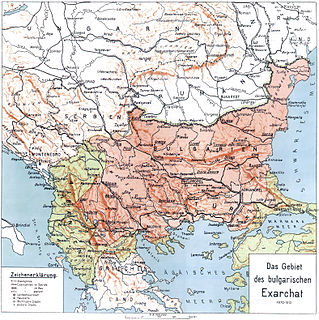 W
WGreater Bulgaria is a term to identify the territory associated with a historical national state and a modern Bulgarian irredentist nationalist movement which would include most of Macedonia, Thrace and Moesia.
 W
WBundu dia Kongo, known as BDK, is a new religious movement with a political and cultural agenda that is associated with the Kongo ethnic group. It was founded in June 1969 by Ne Muanda Nsemi, who is the group's current leader, and is mainly based in the Kongo Central (Bas-Congo) province in the Democratic Republic of the Congo. The movement supports Kongo nationalism and the creation of an ethnically-Kongo state that would encompass parts of the modern-day Democratic Republic of the Congo, Angola, Gabon and the Republic of the Congo.
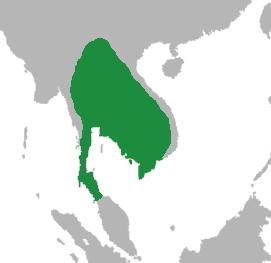 W
WCambodian irredentism is a nationalist movement in Cambodia that refer to the land that used to be part of the Khmer Empire. The irredentist movement in Cambodia is aimed against the control by Thailand, Vietnam and Laos. Irredentist, official and unofficial Cambodian claims on territories viewed by Cambodians as having been under some form of Cambodian sovereignty, are rhetorically tied back to an accused expansionism.
 W
WGran Colombia is the historiographical designation for the state, then known simply as Colombia, that encompassed much of northern South America and part of southern Central America from 1819 to 1831. The state included the territories of present-day Colombia, Ecuador, Panama and Venezuela, and parts of northern Peru and northwestern Brazil. The term Gran Colombia is used historiographically to distinguish it from the current Republic of Colombia, which is also the official name of the former state.
 W
WGreater Croatia is a term applied to certain currents within Croatian nationalism. In one sense, it refers to the territorial scope of the Croatian people, emphasising the ethnicity of those Croats living outside Croatia. In the political sense, though, the term refers to an irredentist belief in the equivalence between the territorial scope of the Croatian people and that of the Croatian state.
 W
WCroatian nationalism is the nationalism that asserts the nationality of Croats and promotes the cultural unity of Croats.
 W
WGreater Palestine is an irredentist notion used by some Palestinian nationalists seeking to establish a Palestinian nation state over the whole of former Mandatory Palestine. Some Palestine Liberation Organization officials extended the claims in the 1970s and 1980s to include Jordan. The term is contrary to the terms Greater Syria and the Arab homeland.
 W
WThe Greater Romania Party is a Romanian nationalist political party. Founded in May 1991 by Eugen Barbu and Corneliu Vadim Tudor, it was led by the latter from that point until his death in September 2015. The party is sometimes referred to in English as the Great Romania Party.
 W
WGreater Tamil Nadu is an irredentist concept of Tamil nationalism that centers on forming a national homeland for the Tamils by merging the Tamil speaking areas of India proper and Sri Lanka. However such areas also include large Kannada and Telugu speaking populations in the northern part, a Malayalam-speaking population in the southwest and Sinhalese people on the islands. Greater Tamil Nadu was proposed by various Tamil groups such as Naam Tamilar led by S. P. Adithanar in 1958 and the Tamil Nadu Liberation Front (TNLF) and the Tamil National Retrieval Troops (TNRT) in the late-1980s.
 W
WGuayana Esequiba is a disputed territory of 159,500 km2 (61,600 sq mi) west of the Essequibo River that is administered and controlled by Guyana but claimed by Venezuela. The boundary dispute was inherited from the colonial powers and is complicated by the independence of Guyana from the United Kingdom in 1966.
 W
WGreater Indonesia or Greater Malay, in Indonesian and Malaysian Indonesia Raya or Melayu Raya, was a political concept that sought to bring the so-called Malay race, only part of which were the actual Malays, together by uniting the British territories of Malaya and Borneo with the Dutch East Indies became a large and sovereign nation. It was espoused by students and graduates of Sultan Idris Training College for Malay Teachers in the late 1920s, and individuals from Sumatra and Java including Mohammad Yamin and Sukarno in the 1950s. Indonesia Raya is also the name of the Indonesian national anthem.
 W
WThe Inner Mongolian independence movement, also known as the Southern Mongolian independence movement, is a movement for the independence of Inner Mongolia and the political separation of Inner Mongolia from the People's Republic of China. It is principally led by the Mongolian diaspora in countries like Japan and the United States, and in some European countries.
 W
WGreater Israel is an expression, with several different Biblical and political meanings over time. It is often used, in an irredentist fashion, to refer to the historic or desired borders of Israel.
 W
WThe Israeli–Palestinian conflict is the ongoing struggle between Israelis and Palestinians that began in the mid-20th century amidst the greater Arab–Israeli conflict. Various attempts have been made to resolve the conflict as part of the Israeli–Palestinian peace process.
 W
WThe Kuril Islands dispute, also known in Japan as the Northern Territories dispute, is a disagreement between Japan and Russia and also some individuals of the Ainu people over sovereignty of the four southernmost Kuril Islands. The Kuril Islands is a chain of islands that stretch between the Japanese island of Hokkaido at the southern end and the Russian Kamchatka Peninsula at the northern end. The islands separate the Sea of Okhotsk from the Pacific Ocean. The four disputed islands, like other islands in the Kuril chain that are not in dispute, were annexed by the Soviet Union following the Kuril Islands landing operation at the end of World War II. The disputed islands are under Russian administration as the South Kuril District of the Sakhalin Oblast. They are claimed by Japan, which refers to them as its Northern Territories or Southern Chishima, and considers them part of the Nemuro Subprefecture of Hokkaido Prefecture.
 W
WThe Kuwait Governorate was the 19th governorate of Iraq established in the aftermath of the invasion of Kuwait by Iraq in 1990. It was preceded by the brief puppet state of the Republic of Kuwait. The Kuwait Governorate consisted of most of the occupied Kuwaiti territory, with the exclusion of the northern areas which became the Saddamiyat al-Mitla' District. Saddam Hussein's relative, Ali Hassan al-Majid became the governor of this province.
 W
WLezgistan or Lekia ) may refer to the following:a term occasionally applied to describe the present-day Kurdamir, before the Russian Revolution. an irredentist concept by Sadval separatist organisation which aims a creation of a unified ethno-political entity over the bordering Lezgin-inhabited areas of the Russian Republic of Dagestan and Azerbaijan.
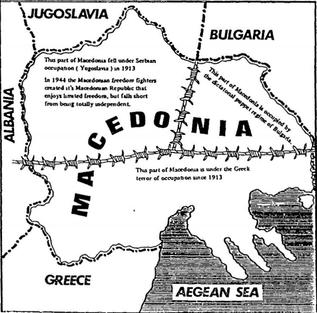 W
WUnited Macedonia, or Greater Macedonia, is an irredentist concept among ethnic Macedonian nationalists that aims to unify the transnational region of Macedonia in Southeastern Europe into a single state that would be dominated by ethnic Macedonians. The proposed capital of such a United Macedonia is the city of Thessaloniki, the capital of Greek Macedonia, which ethnic Macedonians and the Yugoslav leader Josip Broz Tito had planned to incorporate into their own states.
 W
WThe Greater Malayan Confederation, or Maphilindo, was a proposed, nonpolitical confederation of the three Southeast Asian countries.
 W
WGreater Moldova or Greater Moldavia in an irredentist concept according to which the territories of the Republic of Moldova should be expanded to the lands that used to belong to the Principality of Moldavia, specifically including Western Moldavia and the whole of Bessarabia, as well as Bukovina and sometimes, parts of Transylvania. The idea of Greater Moldova was briefly promoted by the Soviet Moldavian politician Nikita Salogor in the aftermath of World War II, and has seen some marginal resurgence in the 21st century.
 W
WPan-Mongolism is an irredentist idea that advocates cultural and political solidarity of Mongols. The proposed territory, called "Greater Mongolia", usually includes the independent state of Mongolia, the Chinese regions of Inner Mongolia and Dzungaria, and the Russian republic of Buryatia. Sometimes Tuva, the Altai Republic and parts of Zabaykalsky Krai and Irkutsk Oblast are included as well. As of 2006, all areas in Greater Mongolia except Mongolia have non-Mongol majorities.
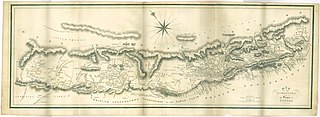 W
WGreater Nepal is a nascent irredentist concept of Nepal extending beyond its present boundaries to include current Indian territories, which were once controlled by the Gorkha army. After defeating some neighbouring kingdoms in wars between 1791 to 1804, the Gorkhas were defeated by the British East India Company in the 1814–16 Anglo-Nepalese War and were made to cede the territories under the 1816 Sugauli Treaty. Greater Nepal is aimed at setting the clock back to the status before the Sugauli Treaty.
 W
WGreater Netherlands is a hypothetical monolingual polity formed by fusing the two Dutch-speaking regions of Flanders and the Netherlands. The concept was originally developed by Pieter Geyl, who argued that the two only separated during the Eighty Years' War against Spain in the 16th century.
 W
WThe North Borneo dispute, also known as the Sabah dispute, is the territorial dispute between Malaysia and the Philippines over much of the eastern part of the state of Sabah. Sabah is previously known as North Borneo prior to the formation of the Malaysian federation. The Philippines, presenting itself as the successor state of the Sultanate of Sulu, retains a "dormant claim" on Eastern Sabah on the basis that the territory was only leased to the British North Borneo Company in 1878, with the sovereignty of the Sultanate over the territory never having been relinquished. However, Malaysia considers this dispute as a "non-issue" as it interprets the 1878 agreement as that of cession and that it deems that the residents of Sabah had exercised their right to self-determination when they joined to form the Malaysian federation in 1963.
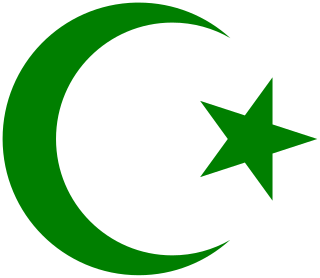 W
WPan-Islamism is a political ideology advocating the unity of Muslims under one Islamic country or state – often a caliphate – or an international organization with Islamic principles. As a form of internationalism and anti-nationalism, Pan-Islamism differentiates itself from pan-nationalistic ideologies, for example Pan-Arabism, by seeing the ummah as the focus of allegiance and mobilization, excluding ethnicity and race as primary unifying factors. It portrays Islam as being anti-racist and against anything that divides Muslims based on ethnicity.
 W
WPashtūnistān is the geographic historical region inhabited by the indigenous Pashtun people of modern-day Afghanistan and Pakistan in South-Central Asia, wherein Pashtun culture, language, and national identity have been based. Alternative names historically used for the region include "Pashtūnkhwā" (پښتونخوا) and "Afghānistān" (افغانستان), since at least the 3rd century CE onward. Pashtunistan borders Iran to the west, Persian and Turkic-speaking areas of Turkestan region to the north, Kashmir to the northeast, Punjab to the east, and Balochistan to the south.
 W
WThe term Greater Romania usually refers to the borders of the Kingdom of Romania in the interwar period. It also refers to a pan-nationalist idea.
 W
WNikita Leontyevich Salogor was a Moldavian and Soviet politician who served as First Secretary of the Communist Party of Moldavia (PCM) in 1942–1946. Of Romanian Ukrainian or Moldovan roots, he had a kulak mother, whom he openly denounced later in life. Salogor's early career was in agricultural institutions of the Ukrainian SSR and the Moldavian Autonomous Soviet Socialist Republic, where he also advanced politically. Following the Soviet advance into Bessarabia in 1940, he joined the leadership of the Moldavian SSR. Immediately promoted to Junior Secretary of the PCM, he was co-opted on its Politburo in early 1941, and took part in a workforce recruitment drive, which is described by historian Ion Varta as connected to the deportation of native Romanians.
 W
WSămănătorul or Semănătorul was a literary and political magazine published in Romania between 1901 and 1910. Founded by poets Alexandru Vlahuță and George Coșbuc, it is primarily remembered as a tribune for early 20th century traditionalism, neoromanticism and ethnic nationalism. The magazine's ideology, commonly known as Sămănătorism or Semănătorism, was articulated after 1905, when historian and literary theorist Nicolae Iorga became editor in chief. While its populism, critique of capitalism and emphasis on peasant society separated it from other conservative groups, Sămănătorul shared views with its main conservative predecessor, the Junimea society, particularly in expressing reserve toward Westernization. In parallel, its right-wing agenda made it stand in contrast to the Poporanists, a Romanian populist faction whose socialist-inspired ideology also opposed rapid urbanization, but there was a significant overlap in membership between the two groups. Sămănătorul's relationship with the dominant National Liberal Party was equally ambiguous, ranging from an alliance between Sămănătorul and National Liberal politician Spiru Haret to Iorga's explicit condemnation of 20th century Romanian liberalism.
 W
WGreater Somalia is a concept to unite all Somali-speaking nations comprising the regions in or near the Horn of Africa in which ethnic Somalis live and have historically inhabited. The territory historically encompassed British Somaliland, Italian Somaliland, French Somaliland, the Somali Region in the Ethiopian Empire and the former Northern Frontier District in the Colony and Protectorate of Kenya. At the present, it encompasses Somaliland, southern Somalia, eastern Djibouti, the Somali region and Dire Dawa in Ethiopia, and the Lamu, Garissa, Wajir and Mandera Counties.
 W
WThe South Tyrolean Freedom is a separatist and national-conservative political party active in South Tyrol, where it seeks to represent the German-speaking population.
 W
WThe region of Syria, known in modern literature as Greater Syria, "Syria-Palestine", or the Levant, is an area east of the Mediterranean Sea. Throughout history, the region has been controlled by numerous different peoples, including ancient Egyptians, Canaanites, Israelites, Assyria, Babylonia, the Achaemenid Empire, the ancient Macedonians, the Roman Empire, the Byzantine Empire, the Rashidun Caliphate, the Umayyad Caliphate, the Abbasid Caliphate, the Fatimid Caliphate, the Crusaders, the Ayyubid dynasty, the Mamluk Sultanate, the Ottoman Empire, the United Kingdom and the French Third Republic.
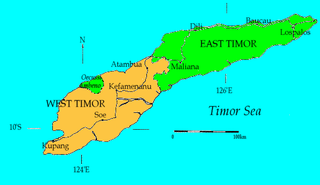 W
WThe unification of East Timor, an independent state, and West Timor, a territory of Indonesia, both parts of the island of Timor, has been raised since the mid-20th century. Great Timor refers to the irredentist concept of a united and independent island of Timor, covering formerly Portuguese East Timor and formerly Dutch West Timor.
 W
WThe Unified Nepal National Front is a political organisation whose main objective is the return of the territories of Nepal lost as a result of Sugauli Treaty on 4 March 1816. Secondary priorities include the promotion of Nepalese national unity and security, focused on the concept of 'Greater Nepal'. Its chairman is Phanindra Nepal.
 W
WUnited Slovenia is the name of an unrealized political programme of the Slovene national movement, formulated during the Spring of Nations in 1848. The programme demanded (a) unification of all the Slovene-inhabited areas into one single kingdom under the rule of the Austrian Empire, (b) equal rights of the Slovene language in public, and (c) strongly opposed the planned integration of the Habsburg Monarchy with the German Confederation. The programme failed to meet its main objectives, but it remained the common political program of all currents within the Slovene national movement until World War I.
 W
WVietnamese irredentism, also known as Greater Vietnam, is an irredentist and nationalist claim concerning redemption of territories of Vietnam. The idea is associated with Vietnamese revisionism, targeting at least to regain control over territories that used to be inhabited by ancient Baiyue peoples in the past.
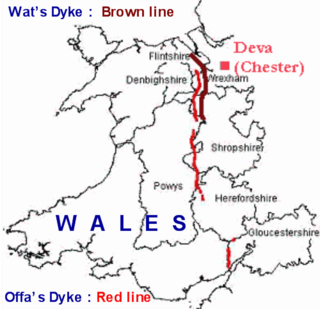 W
WThe Lost Lands of Wales, a minor political idea of the mid 1960s, called into question the status of areas along the east side of the England–Wales border which its proponents regarded as Welsh. The idea was propounded by the Lost Lands Liberation League, and related to parts of the counties of Cheshire, Gloucestershire, Herefordshire and Shropshire.
 W
WGreater Yemen also known as South Arabia is a geographic term denoting territories of historic South Arabia which included the present territory of the Republic of Yemen as well as the Saudi regions of 'Asir, Najran, Jizan, adjacent islands in the Red Sea, adjacent parts of Tihamah and the Omani governorate of Dhofar.